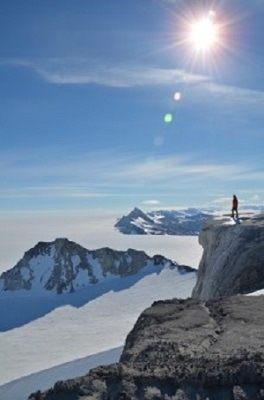Aug 23 2016
Fresh understanding of West Antarctica has revealed how the region’s ice sheet could become unstable in a warming world.

Scientists from Northumbria University, the University of Edinburgh, Newcastle University and the Scottish Universities Environmental Research Centre, have determined how the West Antarctic Ice Sheet reacted to a period of warming after the coldest point of the most recent Ice Age, some 21,000 years ago.
As the Earth warmed, the ice sheet reached a tipping point after which it thinned relatively quickly, losing 400m of thickness in 3,000 years, researchers found. This caused sea levels around the world to increase by up to two metres. Their findings will help scientists understand how the region may behave under future environmental change.
Researchers studied peaks protruding through ice in the Ellsworth Mountains on the Atlantic coast of the continent, to determine how the land’s ice coverage has changed since the Ice Age. Scientists used chemical technology – known as exposure dating – to calculate how long rocks on the mountainside had been free from ice cover. They used their results to determine how the height of the ice sheet had changed over thousands of years.
They found that this sector of the ice sheet – close to the Weddell Sea – had remained covered with thick ice long after other parts of the Earth had begun to emerge from the Ice Age. Heavier snowfall, caused by warmer air, probably helped to maintain the ice thickness.
As the seas warmed, ice at the coast began to be lost to the oceans. Eventually, a tipping point was reached after which the ice sheet thinned more rapidly, retreating inland. The study was published in Nature Communications. It was supported by the Natural Environment Research Council.
Ice sheets never quite respond in the way we would expect – in a warming world some ice sheets become unstable and collapse, yet some grow larger due to increased snow fall. This study helps us understand the timing of such responses in west Antarctica.
Professor John Woodward, Northumbria University
Cold and paleo environments are one of Northumbria’s research specialisms in the Department of Geography. Research involves field based projects in cold regions across the globe, including Antarctica, a range of high Arctic European and Canadian sites, New Zealand, the Alps, Alaska and Chile.
West Antarctica has undergone complex changes since the last Ice Age, and it quickly became unstable – similar processes may dominate the future of the region in a warmer world.
Dr Andrew Hein, University of Edinburgh’s School of GeoSciences
The group applies novel techniques to field data collection, including ground-penetrating radar, new borehole radar technologies, seismics, NIR camera techniques, meteorological monitoring technologies, the use of unmanned aerial vehicles (UAV) and terrestrial laser scanning (TLS), to address fundamental questions in Earth Systems Science. Cutting-edge physical and numerical modelling, remote sensing and laboratory techniques for palaeo-environmental work are also applied.
Northumbria offers a range of courses in Geography and is ranked Top 30 in the UK based on research power following the results of the Research Excellence Framework 2014. To find out more about studying at Northumbria go to: www.northumbria.ac.uk/geography
Northumbria is a research-rich, business-focused, professional university with a global reputation for academic excellence. To find out more about our courses go to www.northumbria.ac.uk
If you have a media enquiry please contact our Media and Communications team at [email protected] or call 0191 227 4571.